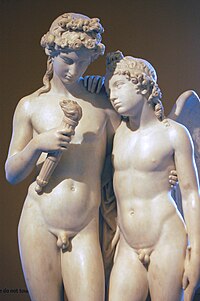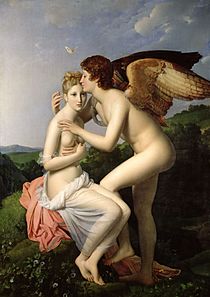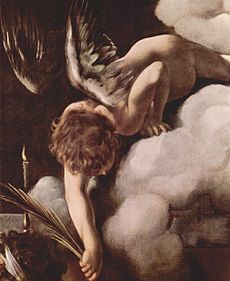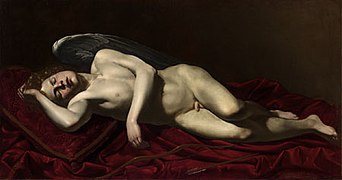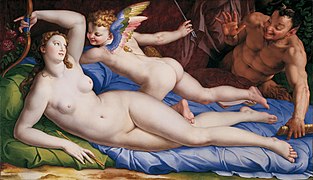Cupid
Cupid (also called Love in Latin poetry) is, in Roman mythology, the god of amorous desire. According to the most widespread version, he is son of Venus, the goddess of love, beauty and fertility, and Mars, the god of war. He is usually depicted as a naked, winged boy, blindfolded and armed with a bow, arrows, and quiver. The equivalent of him in Greek mythology is Eros.
Etymology
"Cupid" is a Latin word related to others whose etymology revolves around "desire":
Cupiditas: Craving, appetite, craving, passion.
Cupidus: Desirous, anxious, passionate, the one who loves and desires passionately.
As a proper name, Cupido passed without variation from Latin to Spanish, taking it from the nominative and not from the accusative, as is customary. It was precisely the name that the poet Virgil, in the Aeneid, gave to the god son of Venus.
Myth
Birth
There are several versions about the birth of Cupid. According to Seneca, he is the son of Venus and Vulcano. For Cicero, in the third book of De natura deorum, they were different Cupid (who would be identified with the Greek Himerus), son of Night and the Erebus, and Love (whose Greek equivalent would be Eros), son of Jupiter and Venus. The first, violent and capricious; the second, soft and delicious. However, the most widespread version, according to which Cupid is the son of Venus (Aphrodite) and Mars (Ares), seems to come from the Greek source of Simonides of Ceos.
According to this latest version, Cupid was born in Cyprus, like his mother, who had to hide him in the woods and let him be suckled by beasts that were only merciful to him. Venus did not dare to have him with her, fearing the rigor of Jupiter, who, foreseeing all the harm that the child would do to the universe, intended to strike him down at birth. Fate, however, allowed Cupid to stay safe. He grew up beautiful like his mother, and bold like his father, and unable to be guided by reason, like his wild nurses. In the forest he made a bow from ash wood, and arrows from cypress. Later, Venus gave him a golden bow and arrows. Cupid's arrows were of two types: some had a gold tip, to grant love, while others had a lead one, to sow oblivion or heartbreak. In addition, he was granted the power that neither men nor gods, nor his own mother nor even his own breast were immune to the wounds produced by his arrows, as evidenced by his love for Psyche, whom he himself he was subdued. The Nereid Thetis, on the day of her wedding to Peleus, obtained Jupiter's forgiveness for Cupid, and the grace to be admitted among the patrician gods.
Miguel de Cervantes, in Chapter XX of the second part of Don Quixote de la Mancha, puts these descriptive verses in the mouth of Cupid:
«I am the mighty godin the air and in the earth
Command, remove, put and veto. »
and in the wide sea
and as soon as the abyss encloses
in his dreadful chakra.
I never knew what fear is;
all I want,
Even if I want the impossible,
and in all that is possible
Venus was concerned that her son was not maturing and growing, so she consulted with the Oracle of Themis, who told her: "Love cannot grow without passion." Venus did not understand these words until her other son was born, Anteros, who is the god of reciprocated love and passion, or love that corresponds to the first, and with whom Cupid is not always united. That is why Cupid is represented as a child with wings, to indicate that love usually passes soon, and with his eyes blindfolded to prove that love does not see the merit or demerit of the person to whom it is directed, nor its defects, while he fixes on her. Cupid is also armed with a bow, quiver, and arrows, some of gold to instill love, and others of lead to remove it. blindfolded, a "mischievous and blind" love, as it was portrayed.
Cupid and Hymenaeus
Hymenaeus, god of marriage, is, according to one of the versions of his birth, the son of Venus and Bacchus, and therefore the half-brother of Cupid, who is depicted fanning Hymenaeus' torch; that is to say, Love fuels the passion of marriage.
José Agustín Ibáñez de la Rentería, in his Fables in Spanish verse, narrated this legend as follows:
Cupid and HimeneoIn the Leo poets
for faithful companion of Himeneus.
that Cupid played with Himeneus:
Venus, your two sons well wanted,
I always wanted to put them in peace;
but it was a vain company:
If they had peace today, war tomorrow.
At last Venus tired of chimeras
with a strong feeling
In separating them he really consented:
To the gods he realized his attempt,
seeing Himeneus the sanity,
and of Cupid the fatal madness,
to the last in his blind vanish
a perpetual loneliness condemned,
and to sacred friendship
Cupid and Nymphea
Irritated by the scorn of the goddess Diana, Cupid one day took his arrows, mounted his bow, took one of them and aimed it at Diana's heart. The arrow flew to her target, but did not hit Diana, who in a quick movement managed to dodge it. However, the arrow pierced the breast of Ninfea, one of Diana's nymphs.
Ninfea was thus in love, and her heart experienced what it had never felt before; an unknown ardor consumed her. She was then torn between a blind desire and modesty. She cursed the austere laws, and she bitterly complained of the yoke that necessity imposed on her. She tried within herself to pluck the arrow, but she couldn't. With groans and complaints she launched into the woods. "Oh shame! she exclaimed she-she; you, the most precious and most beautiful adornment of a sacred nymph; if my spirit is guilty towards you of a living feeling that offends you, my body is still innocent; let this victim be enough for your sublime anger; may this pure wave wash me from a crime that I conceived for my sorrow, and that my will with horror detests." Thus she said, and raising her eyes to heaven, flooded with tears, she rushed into the waters. Meanwhile, her companions were looking for her. The dryads finally found her. Diana deplored Ninfea's horrible fate, but she did not allow her body to be submerged. On the ripples of the water she floated it, and she made it into the flower she calls the water-lily, brilliant white, with a stately stem of broad green leaves. Since then, the waters surrounding the water lily have been calm and calm.
Diana wanted that, since Nymphea had calmed the fires of the passion of the son of Venus in the cold element of water, likewise the water lily had the property of calming, and of dulling the senses so as not to surrender to the ardor of the voluptuousness Since that time, the nymphs no longer fear Cupid's arrows, since the humble water lily protects them and serves as an antidote to Love's attacks.
Cupid and Psyche
The Roman writer Apuleius narrated the story of Cupid and Psyche in his work The Golden Ass.
Apuleyus tells that in a certain remote land there was a king and a queen, parents of three daughters. The smallest and most beautiful of all was called Psyche (representation of the soul). Her beauty was such that she was reputed to be a second Venus. Her father, through the Oracle of Delphi, tried to get her a partner. The Oracle told her that she was not destined for any mortal lover, "because the love of the soul is always immortal", but a deformed god and fearful to the other gods and even to Pluto himself. He also added that they should leave the princess on a hill on the edge of a precipice, but dressed in her wedding dress.
Venus, jealous of Psyche's beauty, asked Cupid to use his golden arrows to make Psyche fall in love with the ugliest man in the world; Cupid agreed. While that was happening, Psyche went to the top of the mountain. Zephyr, the god of the west wind, came, snatched her up, and led her floating gently in the middle of a forest, where there was a magnificent palace, apparently uninhabited. At that moment Cupid appeared, who upon seeing Psyche was captivated by her beauty.
When Psyche entered the palace, she was surprised to find it full of jewels and ornaments. When night came, Cupid joined her, and left her before dawn, fearing to be seen: this lasted many nights. Cupid asked Psyche never to light any lamp because he did not want to be seen. The princess felt very safe when he visited her at night, even though she did not see her face, because she felt that she was her longed-for husband.
The king and queen, worried after a while, sent their daughters in search of Psyche. Cupid forbade Psyche to let herself be seen by them, but seeing her saddened and melancholic, he finally consented to her speaking to them, provided she did not follow her advice. Céfiro led the sisters of Psyche to the castle, who after telling them the joys that she enjoyed, gave them rich presents. On a second visit, the sisters discovered that Psyche did not see her husband, and jealous as they were that their younger sister lived in such a beautiful palace, they told her that the Oracle of Apollo had said that her husband was a monster, surely a serpent that it would end his life in a horrible way.
Psyche, terrified by the fatal news, accepted the perfidious advice of her sisters: the following night, when her husband was sleeping, she got out of bed to take a sword with which to kill him; but at the moment she took the lamp, she observed that instead of a monster it was the god Cupid who was sleeping. In spite of having doubted her happiness, she Psyche takes the sword and tries to plunge it into her chest, but her sword falls from her hands; she then considers using Cupid's bow and arrows, but she injures her finger touching an arrowhead. She turns to look at her husband again, who generates immense passion for her, but a drop of oil from the lamp falls on Cupid's back; he wakes up, and instantly takes flight. Psyche tries to stop him by taking him by one foot, but Cupid's strength is superior, and he lifts Psyche up.
Approaching a cypress tree, Cupid drops Psyche, reproaching her for her mistrust. Desperate, Psyche rushes into a river, but the water immediately throws her to the banks of it. She meets the god Pan, who tries to comfort her. Wandering through the forest, Psyche finally arrives at the house of one of her sisters, and tells her, to get back at her, that Cupid has threatened to marry one of them. Excited, Psyche's sister runs to the precipice from where she expected Céfiro to appear to lead her, as she had done with Psyche, to Cupid's palace. When she felt a strange wind on her face, the girl threw herself off the precipice, believing that Cefiro would hold her, but she perished miserably. Psyche took revenge in the same way with her other sister.
Venus, upon learning that her son was suffering cruel pain, believed it her duty to go in search of Psyche to make her suffer for her temerity. Psyche, for days, had been walking through the forest in search of the palace of her beloved Cupid. Arriving near a temple, he made a bunch of wheat ears which he found scattered on the ground, and offered them to Ceres, begging her to grant him her protection; but the goddess replied that the only grace she could do for her was not to deliver her into the hands of her enemy. Juno, whom she also found in one of her temples, gave the same answer in almost equal terms.
Psyche decided to go in search of Venus, in whose company Cupid would be. He indeed finds Venus, but the goddess, outraged, pays no attention to her pleas and goes up to Olympus. She then begs Jupiter to send Mercury in search of Psyche, who was in the temple with a pleading gesture. When Psyche is presented to Venus, the goddess, irritated, pulls out her hair, tears her clothes to shreds, hits her on the head, and immediately having formed a heap of mixed grains of wheat, barley, millet, poppies, peas, lentils and beans, he ordered her to separate all these grains before nightfall, and left her in the company of Sadness and Solicitude.
Psyche, devastated, remained speechless and motionless, but the officious ants separated the grains and got her out of the compromise. Venus then sent her to bring her a golden wool sheath from certain rams that grazed on the opposite bank of a river in inaccessible places. Psyche, instead of trying to comply with her order, tried to rush into the waters of the river, but a reed, making strange sounds, taught her how to take the skin, which she immediately took to Venus.
Venus, who was not appeased by such effective obedience, then ordered Psyche to bring her a vessel full of black water that ran from a fountain guarded by dragons. An eagle takes the vessel, fills it with said water and places it in the hands of Psyche so that she can present it to Venus. A new task, more difficult than the previous ones, then occurred to Venus. As the goddess lamented that because of her concern for her son her beauty had diminished, she commanded Psyche to descend to the Underworld and ask Proserpina for a chest containing some of her graces.
Psyche, believing that she could find no other way to reach the kingdom of Pluto than to kill herself, was about to fall from the top of a tower, when a voice told her that the way to hell was through Tenaro, near Lacedaemon, but that she should go provided with two cakes, one in each hand, and two coins, which she would carry in her mouth; that he would find Charon, that he would spend it in his boat, giving him one of the coins, which he would take from his mouth. Charon would spend it in his boat. That when she found the Cerberus, who guards Proserpina's court, she should give him one of the cakes, and that she would thus find Proserpina, who, after welcoming her favorably, would invite her to a feast that she was about to give, but which had to be modest. and agree to just sit on the floor and eat brown bread. Lastly, the goddess would give him her chest, which she would take care to keep closed. Psyche complied with the instructions that the voice gave her, and received from Proserpina what Venus asked of her. After she had left hell, she was curious to open the box in order to take for herself something of the beauty that it contained, but she only found an infernal and soporific vapor that made her fall to the ground, lethargic.
She would never have woken up if Cupid, cured of his spite, had not escaped from his mother's palace in search of his beloved Psyche. He found her asleep, woke her with a kiss, returned the steamer to her box, and told Psyche to take her to her mother. Cupid flew to Olympus, appeared before Jupiter, who assembled the gods, promising Cupid that he himself would keep dear Psyche from her, and that Venus would make no further opposition to her liaison with her. At the same time he warned Mercury to lead Psyche to Olympus.
Psyche, admitted among the gods, drank ambrosia and became immortal. She prepared the wedding feast. Even Venus herself had to dance. Cupid and Psyche were covered with a transparent veil. Cupid held a dove, a symbol of conjugal love. Both had their hands linked with a string of pearls. Hymeneo led them, and while a putti places a basket of fruit on the heads of the spouses, another prepares the bed.
From that moment, Psyche acquired butterfly wings, common emblem of the soul in the ancients, usually folded up and shaped like a shell. After the wedding, Psyche gave birth to the three Graces shortly after: Voluptas, the Grace of Voluptuousness, Castitas, the Grace of Chastity, and Pulchrito, the Grace of Pulchritude. This last Grace, a balance between the first two.
The Spanish poet Juan de Arguijo wrote a sonnet about the legend of Psyche and Cupid:
Psique to CupidTo your divine front, oh mighty
my firm love, and a blind my beauty.
boy, a bandage with work and art
woven gold and colors, where part
I retracted from your glorious triumph.
There it is attached to the victorious
chariot the great Febo, let the light spread,
prisoner Mercury, chained Mars,
and Vulcan with jealous samples.
He couldn't get rid of the real ones.
Jove bad could psyche
to resist, if these yield your girth.
Enlarge my prison more evils,
being a force for a child to sacrifice
Cupid as Ascanio
In Book I of the Aeneid, the poet Virgil tells that Venus, wanting Dido to treat Aeneas well, asks her son Cupid to replace Ascanio and produce in Dido love for Aeneas:
But the Citerea new girls, new plansin his chest, so that with the face and body of sweet Ascanio
the queen's passion, and put the fire in her bones. (...)
Cupid is presented and lit with your gifts
So with these words it is addressed to the Lighting Love:“My son, my strength, my great power, the only
Juno's hospitality: he won't let this happen. (...)
that despises can the darts of your excellent father,
in you I shelter and beg your help claim.
May your brother Eneas walk in the sea shaken
for all the coasts because of the hatred of the Juno fence,
You know it very well and often our pain hurt you.
Now it's held by the Dido Phoenician and entertained with softness.
words, and I'm afraid where he can lead
By order of his dear father will go to the cityI was the real child, the greatest object of my dates,
I don't want you to warn him about your fire and fool him with your drug. »
carrying with him the present rescued to the sea and the flames of Troy;
I'm gonna hide it, deep asleep, at the tops.
of Cyther or in the sacred abode of the Idalia,
so that learning can't from my deceptions or interpose.
You, for no more than one night, take her look.
with deceit, and, child, as you are, you saw the known traits of the child
So, when he takes you in his very happy lap
between the royal tables and the liquor,
when he gives you his hugs and fills you with sweet kisses,
Epithets
Cupid (Love), like other Roman deities, had some epithets applied to him to reflect the diversity of attributes ascribed to him. Among his epithets are the following:
- Amphitalés, Magus, Sophist, Tyrannus: because love must be reciprocal (although it is not always).
- Geminus: for he dwells in Heaven and on Earth.
- Ommateius Oculeus: because love has its origin in the sense of sight.
- Pandemos: because it dominates everything.
- Phaleratus and Toxotes: for carrying carcaj.
- Pothos e Himeros: by desire.
- Pteros, Pterotos, Alatus, Aliger, Pennatus: for being a praised god.
- Toxalcés: powerful by his carcaj.
- Typhlós and Caecus: for being a blind god, or blind.
Impact on culture
As one of the icons of love, Cupid has survived ancient mythology to become part of the contemporary collective imagination. Precisely, one of the symbols of Valentine's Day, along with the heart, the color red or chocolates, is the winged child, who is no longer usually represented naked, as in ancient times, but with diapers. He has even been taken for an angel, in the Christian way.
In the language
The name of this god has become a common noun in Spanish to refer to a man who is in love and flirtatious, as well as to the representation of winged children armed with bows and arrows, also called "little boys." He is also known as the god of life.
Cupid's arrow also has Greco-Latin origins, and its influence was clearly noted in Spanish poetry since medieval times, even without the appearance of the god Amor. Under multiple names (vira, asta, arrow, arrow, shots, harpoon, dart, thorn...), appears in medieval, Renaissance and post-Renaissance literature with a sense of love that is repeated indefinitely with few different nuances and much rhetoric.
Early in Spanish literature, Cupid is mentioned by Alfonso X of Castile, called El sabio:
"Because I beseech thee by the soul of thy father, and by the weapons of Cupid, and ermano, and by the good omens that walk with me to the land, and by the god of Troy of whom thou after the relics. »
The theme of the arrow reaches a higher plane, tinged with new conceptual touches with a transcendent dimension and paradoxical expression, when it is developed in versions alo divino. Of these, the narration of Saint Teresa of Jesus is significant in a passage from her Book of her life, in which she recounts her transverberation in the presence of a Seraphim:
« Quick, beautiful, heavenly Cupid,in the sun bonfire the axe lighting,
throw it away for himself, by pulling the dart. »
of short dart in gold armó bruñido
the asta, flame feathers shaking:
He left his heart hurt,
and repeated the blow, pretending
greedy the gallar seraphim
Works from the Baroque period also stand out, such as the comedy Ni amor se libera de amor, written on the theme of Psyche and Cupid by Pedro Calderón de la Barca, as well as his two sacramental plays, also on the same theme, Psiquis y Cupido, for Toledo and for Madrid respectively.
In Spanish literature there are multiple and recurring appearances of Cupid as a prominent character and as an allegorical representation of Love. An example is Epigrama CXLVI by León de Arroyal:
A CupidTransfer my padding
You would have made it.
heart with your harpoons
You try, rapacious Cupid:
If you throw me doublons,
Iconography
Cupid is generally represented as a naked child, winged and armed with a bow, arrow and quiver, with his eyes covered by a blindfold, which means how far love is from reasoning, and that, while it lasts passion, the defects of the loved one are not seen. William Shakespeare wrote about it:
"Love does not see with the eyes, but with the soul, and therefore they paint the cupid wing blind. Neither in the mind of Love has there been any sign of discernment. Wings without eyes are emblematic of imprudent premura, and because of it it it is said that love is a child, because in the choice yerra frequently. Just as naughty children are seen to violate their oaths in the games, so the rapacious Love is perjured everywhere. »Dream of a summer night. Act I, Scene First.
Sometimes he is shown carrying a flaming torch; also, crowned with roses, or holding a rose in one hand, as an emblem of the delicious but fleeting pleasures he procures. The fleeting passion that Cupid inspires is also a symbol of his wings, which can be golden or blue.
The figure of Cupid in the form of a putto is a recurring image. In the case of romantic love, he is usually represented with a bow and arrows, which, often blindfolded, he shoots at people, thus making them fall in love.
Since the Renaissance, the figure of the putti came to be confused with the cherubs, a confusion that persists today. Both putti and cupids and angels can be found in religious and secular art from the 1420s in Italy, from the late 16th century in the Netherlands and Germany, from the Mannerist period and the late Renaissance in France, and throughout the Baroque in ceiling frescoes. They have been represented by so many artists that presenting a list of them would be of little use, although among the best known are the sculptor Donatello and the painter Raphael; two putti in a curious and relaxed attitude that appear at the feet of his Sistine Madonna are frequently reproduced.
They underwent a major revival in the 19th century, beginning to appear cavorting in works by academic painters, from Gustave Doré's illustrations for Orlando Furioso, to advertisements. Currently they are a motif widely used as a representation of love in images intended for marketing; such is the case with many Valentine's postcards.
Image gallery
Contenido relacionado
Astaroth
Níðhöggr
Ratatosk




